Pediatric Pulmonology Fellowship
The UNC Pediatric Pulmonary Training Program is an ACGME (Accreditation Council for Graduate Medical Education) accredited program designed to train the next generation of pediatric pulmonologists to be skilled clinicians and productive investigators. The program provides an intensive three-year experience in pediatric pulmonology and lung biology that includes training in the clinical, research, and educational skills necessary to be a successful academic pediatric pulmonologist. Fellows practice in state of the art facilities and receive exposure to children with a broad range of lung diseases including asthma, cystic fibrosis (CF), primary ciliary dyskinesia (PCD), and others.
Fellowship training at UNC enhanced by the presence of multiple specialty centers including:
- A busy Pediatric Bronchoscopy program that performs 500-700 procedures annually including bronchoscopic intubations, brush biopsies, and mucous plug removal.
- One of the largest Cystic Fibrosis Care Centers in the Southeast, following ~300 children with CF.
- The PCD Clinical and Research Center, one of ten centers nationwide that are part of the Genetic Disorders of Mucociliary Clearance Consortium that serve to diagnose, treat, and study rare lung diseases such as PCD.
- The NC Children’s Airway Center, a multidisciplinary Patient-Centered Specialty Practice center that includes specialists from ENT, pulmonary, sleep medicine, speech therapy, and more to diagnose and treat children with complex airway diseases.
- The UNC Children’s Allergy & Asthma Center, North Carolina’s only comprehensive pediatric allergy and asthma center that aligns pediatric specialists from allergy and immunology, pulmonology, respiratory therapy, and more to provide expert diagnosis, personalized care plans, and comprehensive education for patients with asthma
- The Marsico Lung Institute, one of the most academically productive basic and translational science institutes for pulmonary diseases in the nation.
Our program is structured to fulfill American Board of Pediatrics (ABP) eligibility criteria for certification in Pediatric Pulmonology. In accordance with the Program Requirements for Residency Education in Pediatric Pulmonology published by the Accreditation Council for Graduate Medical Education (ACGME), the fellow’s time will be structured such that roughly one-third of the total time is devoted to clinical training, and two-thirds to training in research and teaching skills.
The UNC Pediatric Pulmonology Training Program is typically a three-year program, although we are open to non-traditional fellowship training programs including combined fellowships with adult Pulmonary or Pediatric Intensive Care Medicine or fast track programs as outlined by the ABP.
The curriculum includes three core elements: clinical service, education and conferences, and scholarly activity. The typical clinical schedule for a three-year fellowship is as follows:
First year:
- 16-20 weeks inpatient/consult service
- 1 full clinic/week (no clinic when on inpatient/consult service)
- 3 to 4 half-day bronchoscopy days per month
Second year:
- 10-12 weeks inpatient/consult service
- 1 full clinic/week
- 2 to 4 half-day bronchoscopy days per month
Third year:
- 4-8 weeks inpatient/consult service
- ½ to 1 full clinic/week (depending on research vs. clinical focus)
- 1 to 4 half-day bronchoscopy days per month
The curriculum does have some flexibility to accommodate special research training needs; the program is happy to discuss alternative curricula with interested applicants to ensure ACGME requirements are met.
Rotation Schedule
Clinical service consists of three main rotations: inpatient/consult service, outpatient clinics, and bronchoscopy. The rotation schedule is flexible depending on the individual fellow’s goals, but generally is structured as follows:
Inpatient/Consult Service
The Pediatric Pulmonology inpatient/consult team leads the inpatient service, performs inpatient and outpatient consults, and addresses any urgent medical issues that cannot be met by a patient’s primary provider. All inpatient rotations take place at the NC Children’s Hospital that is part of the main Chapel Hill campus. Pediatric Pulmonology inpatients “Blue” team includes the Pediatric Pulmonology attending and fellow, a Pediatrics intern, a Pediatrics resident, a ward team coordinator, as well as medical students and residents on elective rotations. The team is also supported by multiple ancillary services including and inpatient pharmacist, respiratory therapy, and CF nurses, all of whom often round with the Blue team. Fellows typically cover the service in one-week blocks, though weekends and weekdays may be scheduled separately. Fellows round with the team in the mornings, address consults and urgent inpatient and outpatient needs in the afternoons, then take home call in evenings and nights while on service.
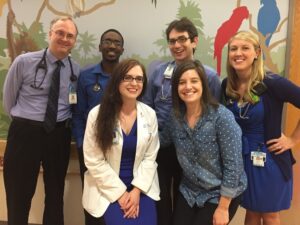
Outpatient
Pediatric Pulmonology fellows serve as the primary pulmonary provider for their own cohort of patients, with one full-day clinic per week (except when on service). Most patients are seen in the NC Children’s Outpatient Center within the NC Children’s Hospital on the main campus in Chapel Hill. In addition, approximately once per month fellows see patients at our satellite clinic in Raleigh, the NC Children’s Specialty Clinic. Each fellow is assigned to a division nurse to help address patient needs outside of clinic, including phone calls and follow up.
Bronchoscopy
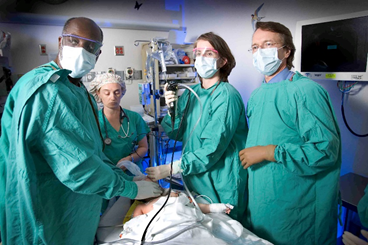
Our division is one of the largest bronchoscopy services in the Southeast, regularly performing between 500-700 procedures each year. Fellows are assigned to cover elective bronchoscopies twice weekly, and they also perform many procedures while on inpatient/consult service. In addition to routine bronchoscopy, fellows often perform more complex bronchoscopic procedures including flexible fiberoptic intubation, brush biopsies, and mucous plug removal. Fellows also regularly participate in combined airway evaluations with ENT on patients with tracheostomy or other airway problems. All of our fellows attend the Bronchoscopy Course in Cincinnati during first year (which is taught by many of our faculty), and most fellows have performed >150 procedures by the end of fellowship.
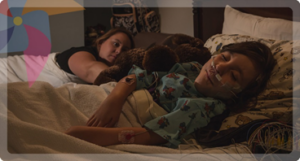
Elective Rotations
All fellows are required to do an elective month with Sleep Medicine, seeing patients in the outpatient Sleep clinic, attending sleep conferences, and reading sleep studies. The UNC Sleep Center includes a dedicated 4-bed pediatric sleep laboratory for polysomnography and Multiple Sleep Latency Tests (MSLT).
Other elective rotations on other services such as Allergy/Immunology, Pediatric Critical Care Medicine, and Palliative Care are available, though are not required. Fellows can also participate in the PCD Clinical and Research Center, and several of our fellows have started their own PCD clinics following fellowship.
The program supports several didactic and education conferences:
- Chest conference – biweekly meeting with radiology to discuss challenging and educational cases, including short didactic talks by fellows and other learners
- Fellows conference – biweekly didactic sessions given by faculty within and outside of the division on relevant clinical topics
- Board review – weekly conference based on the ABP content outline for Pediatric Pulmonology, with a focus on respiratory physiology (West’s Essentials of Respiratory Medicine) and board practice questions
- Division conference – weekly conference for faculty and fellows
- Pediatric Fellowship Seminar Series – biweekly conference for all Pediatric Subspecialty fellows that focuses on research and writing, communication, and professionalism
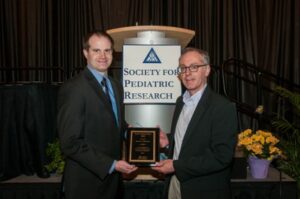
All of our fellows are expected to engage in research or other scholarly activity, including presentations at national meetings and publication of manuscripts. Our fellows have the opportunity to work with nationally recognized experts both within the division and from the wider UNC scientific community, and can choose projects that are basic science, translational, or clinical research.
Our fellows have pursued a wide variety of scholar projects. Recent fellowship projects include:
| Project | Fellow | Primary Mentor |
| Community Health Worker Screening for Asthma in a Resource-Poor Community in Nicaragua | Mary Crocker | Sylvia Becker-Drepps |
| Race, BMI, and asthma control in an equal access to care population. | Marcia Frye | Ceila Loughlin |
| Effect of methylprednisolone pre-treatment on neutrophil production of interferon-gamma during pneumonia in mice. | Olivia Giddings | Claire Doerschuk |
| Relationship Between Chronic Airway Infection And Clinical Outcomes In Children With Tracheostomy. | Catherine Sanders | Charles Esther |
| Influence of bacteria on F508del CFTR correction by VX-809. | Jennifer Guimbellot | Martina Gentzsch |
| Implementation of the pediatric asthma smart form in Epic. | Keith Robinson | Tom Lahari |
| Overweight and obesity may alter immune response to influenza vaccine in children. | Justin Paulson | Terry Noah |
| Relationship of sleep to pulmonary function in mucopolysaccharidosis II. | Will Wooten | Joseph Meunzer |
| Antimicrobial susceptibility and molecular typing of MRSA in cystic fibrosis. | Elizabeth Champion | Marianne Muhlebach |
| Exhaled breath condensate purines correlate with lung function in infants and preschoolers. | Kavita Patel | Charles Esther |
| Laterality defects other than situs inversus totalis in primary ciliary dyskinesia: insights into situs ambiguus and heterotaxy. | Adam Shapiro | Margaret Leigh |
Grant Support Opportunities
Our fellows are strongly encouraged to apply for grants during fellowship, though this is not required for continued training. Our program has a strong track record of obtaining clinical fellowship grants from the CF Foundation, including highly competitive 3rd and 4th-year clinical fellowships. In addition, our program is supported by a T32 award from the NIH that is shared between adult and pediatric programs and represents an excellent mechanism for those interested in careers as a physician scientist.
In addition, there are several smaller grant mechanisms that can be utilized to support fellowship research projects including the NC Children’s Promise awards, small grants from NC Translational and Clinical Science (NC TraCS), and awards from the NC Global Health Initiative.
Mentorship
Excellent mentorship is key towards developing a successful academic career, and the UNC pediatric pulmonology division faculty includes internationally recognized experts who have extensive experience in mentoring trainees. In addition, fellows can seek expert mentorship with faculty from several research institutes or centers at UNC, including:
Marsico Lung Institute (formerly Cystic Fibrosis and Pulmonary Diseases Research and Treatment Center)
Cystic Fibrosis Care Center
The UNC Cystic Fibrosis Care Center is one of the largest in the country, following approximate 300 children with CF. The multidisciplinary team is comprised of specialists with expertise in managing cystic fibrosis including physicians, dietitians, nurses, physical therapists, respiratory therapists, psychologists, and social workers.
Fellows have the opportunity to work with CF patients from diagnosis after newborn screening to end stage lung disease and transplant. In addition, the UNC CF Care Center engages in numerous research, quality improvement, and educational projects. UNC also has an active transition program to facilitate transition of pediatric patients to the adult UNC CF Care Center.
PCD Clinical and Research Center
Ours is one of ten centers nationwide that are part of the Genetic Disorders of Mucociliary Clearance Consortium that serve to diagnose, treat, and study rare lung diseases. Fellows have the opportunity to help perform the comprehensive evaluations for PCD and other rare lung diseases with faculty who are internationally recognized experts in the field.
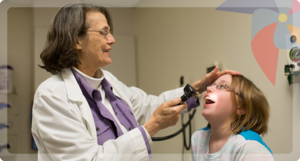
NC Children’s Airway Center
The North Carolina Children’s Airway Center cares for children with complex airway problems, including those with tracheostomies. The Center is a multidisciplinary effort that includes physician providers from ENT, pediatric pulmonology, gastroenterology, sleep medicine as well as other services including speech therapy, respiratory therapy. The airway center has a dedicated nurse practitioner, nurse manager, medical coordinator, and social workers. Fellows participate in weekly airway center meetings, participate in combined airway evaluation with ENT and GI, and see airway center patients in UNC clinics. Fellows also participate in QI and research projects supported by the airway center.

UNC Children’s Allergy & Asthma Center
This center aligns pediatric specialists from allergy and immunology, pulmonology, respiratory therapy, and more to provide expert diagnosis, personalized care plans, and comprehensive education for patients with asthma. Fellows see asthma patients within the center and have the opportunity to engage in basic science, translational, and clinical asthma research.
UNC Palliative Care Program
The UNC Palliative Care Program envisions a health care system that provides excellent palliative care for all patients and families in need. The Program, an interdisciplinary group of professionals, works collaboratively to promote the research, scholarship, and education necessary to achieve this goal. Our core activities include a palliative care consult service, an outpatient supportive care consult service, education and clinical training in palliative care, and research relevant to the practice of palliative care.
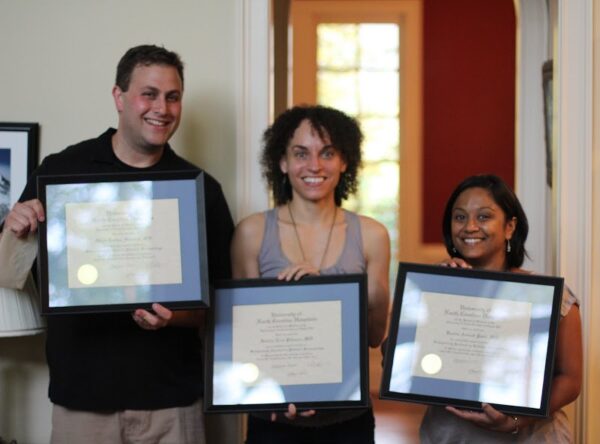
Fellowship Alumni
Pediatric Pulmonary Fellowship GraduatesOur graduates have gone on to become leaders in the Pediatric Pulmonology community, with some staying at UNC and others taking positions at prestigious academic centers including Riley Children’s in Indianapolis, University of Alabama at Birmingham, and Washington University in St. Louis. Many have published important research findings, and several have led workshops to address important clinical issues in CF, PCD, and the ICU.
| Recent national workshops led by former UNC fellows |
| Cystic fibrosis: NHLBI Workshop on the Primary Prevention of Chronic Lung Diseases.
Pittman JE, Cutting G, Davis SD, Ferkol T, Boucher R. Ann Am Thorac Soc. 2014 Apr;11 Suppl 3:S161-8. doi: 10.1513/AnnalsATS.201312-444LD. |
| Diagnosis, monitoring, and treatment of primary ciliary dyskinesia: PCD foundation consensus recommendations based on state of the art review.
Shapiro AJ, Zariwala MA, Ferkol T, Davis SD, Sagel SD, Dell SD, Rosenfeld M, Olivier KN, Milla C, Daniel SJ, Kimple AJ, Manion M, Knowles MR, Leigh MW; Genetic Disorders of Mucociliary Clearance Consortium.. Pediatr Pulmonol. 2016 Feb;51(2):115-32. doi: 10.1002/ppul.23304. Epub 2015 Sep 29. |
| An Official American Thoracic Society/European Respiratory Society Workshop Report: Evaluation of Respiratory Mechanics and Function in the Pediatric and Neonatal Intensive Care Units.
Peterson-Carmichael S, Seddon PC, Cheifetz IM, Frerichs I, Hall GL, Hammer J, Hantos Z, van Kaam AH, McEvoy CT, Newth CJ, Pillow JJ, Rafferty GF, Rosenfeld M, Stocks J, Ranganathan SC; ATS/ERS Working Group on Infant and Young Children Pulmonary Function Testing. Ann Am Thorac Soc. 2016 Feb;13(2):S1-11. doi: 10.1513/AnnalsATS.201511-730ST. |
Application Guidelines
The UNC Pediatric Pulmonary Training Program participates in the National Resident Matching Program (NRMP) for Pediatric Pulmonology. Interested applicants should submit applications via the Electronic Residency Application Service (ERAS). Because our training program is primarily supported by NIH and CF Foundation training grants, we primarily consider candidates who have U.S. or Canadian citizenship or permanent residence status. Exceptions are possible if funding could be secured through another source.
Information on current salary and benefits can be found at the UNC Office of Graduate Medical Education website.
We will occasionally consider fellows outside of NRMP. Interested candidates should contact our office directly.
Contact Information
Contact information for the fellowship program of the Division of Pediatric Pulmonology, Department of Pediatrics, UNC School of Medicine:
Pediatric Pulmonology
University of North Carolina at Chapel Hill
450-D MacNider, CB# 7217
Chapel Hill, NC 27599-7217
Phone: 919-966-1055
Fax: 919-966-6179